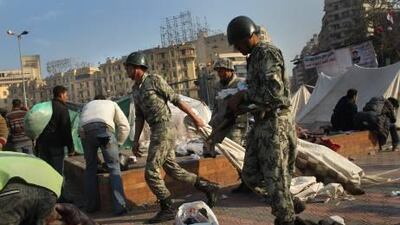CAIRO // Egypt's military rulers yesterday dissolved both houses of parliament, suspended the constitution and pledged presidential and parliamentary elections in six months.
The Supreme Council of the Armed Forces announced the measures in a statement read on state television two days after Hosni Mubarak was ousted as president.
The council, composed of the top generals of each branch of the military, also confirmed Field Marshal Mohamed Hussein Tantawi as its leader.
The 75-year-old defence minister, who is now Egypt's de facto ruler, is regarded as an ally of Mr Mubarak and portrayed in leaked US diplomatic cables as a reluctant reformer.
The reforms came as residents of the Egyptian capital began taking tentative steps toward normality after 18 days of mass rallies that swept revolutionary fervour through much of the country in protests during which at least 300 people died.
In its statement, the Supreme Council said it "will manage the affairs of the country for a temporary period of six months or until the end of elections to the upper and lower houses of parliament, and presidential elections".
In addition to "dissolving the upper and lower houses of parliament", it pledged to establish "a committee to amend some clauses of the constitution and define the rules for a popular referendum on this".
During the transition to civilian rule, the Supreme Council has said it would keep intact the country's current cabinet, appointed recently by Mr Mubarak.
The announcement would seem to meet several of the main demands of the protesters, many of whom called during their demonstrations for thorough and rapid changes to the country's governing institutions.
The parliament was widely considered little more than a rubber-stamp institution of Mr Mubarak and his National Democratic Party, which late last year triumphed in elections tarnished by allegations of widespread fraud and corruption.
Some human rights activists and protesters were optimistic, albeit cautiously, about the military's timetable for transferring power to civilian rule.
"In the absence of a constitution, we have entered a sort of 'twilight zone' in terms of rules, so we are concerned," said Hossam Bahgat, the director of Egyptian Initiative for Personal Rights, a non-governmental organisation. "We are clearly monitoring the situation and will attempt to influence the transitional phase so as to respect human rights."
Shortly before the Supreme Council's statement, Ahmed Shafiq, Egypt's caretaker prime minister, emphasised his priority as restoring security to the country.
"Our main concern now as a cabinet is security. We need to bring back a sense of security to the Egyptian citizen," he said during a news conference.
"Parallel to that we also want to ensure that the daily life of all Egyptians goes back to normal and that basic needs, like bread and health care, are available."
While reassuring that the country could had enough such reserves, he warned that prolonged unrest could present "obstacles".
He also described Egypt's economic circumstances as "solid and cohesive" and, seemingly heeding the demands of protesters, pledged to "return rights to the people and fight corruption".
After all-night celebrations following the president's removal from power, only several hundred demonstrators remained in Tahrir Square. Inching their way through the area, vehicles once again began to clog the square. The military has called on protesters to dismantle their expansive, impromptu living quarters in the square, including the tents and plastic sheeting as well as the makeshift fortifications erected to defend the square against Mr Mubarak's loyalists.
Many of the remaining activists seemed to heed those calls and were busily disposing of the rubble and rubbish that had piled up throughout the nearly three weeks of demonstrations.
Others, however, took a more confrontational stance to the military orders and vowed to remain in the square. They argued with those who wanted protesters to leave.
"The people want the square cleared," one group chanted, while the other responded: "We will not leave. We will not leave."
Sozens of police officers, marching to the ministry of interior through Tahrir Square, were greeted with scepticism by protesters. Egypt's police, seen as agents of repression during Mr Mubarak's three decades in power, are despised by many Egyptians for their brutality and corruption.
While demanding better pay, they also seemed to be extending an olive branch to the many protesters who accuse the police of perpetrating much of the violence against them during the demonstrations.
"The police and the people! With one hand!" yelled the officers.
Observing the scene, Ahmed Shalabi, a 24-year-old student, was unmoved by the gesture.
"After they killed 300 of us, we don't trust them anymore. I am not happy they are here," he said. "You forget what you did to us!"

